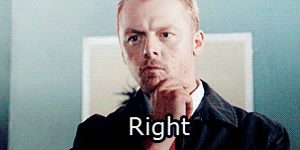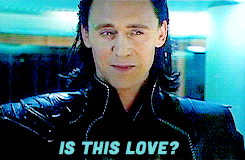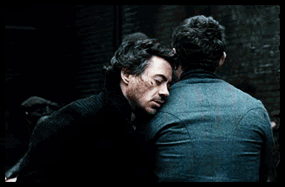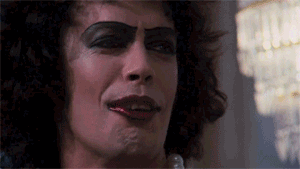What does the phrase “true love” mean? No, really. I don’t mean the all-encompassing, sweeping, romantic type of love. I mean just the particular word combination. True and love are both positive things. Truth implies honesty, as does love…Love is truth. To love is to reveal some part of yourself, even if it’s just a personal revelation. Using the phrase true love is much like the concept of free will. It’s a double-positive, and it’s unnecessary. Maybe I’m just being nitpicky, but these types of word phrasing just irritate me now. They don’t mean what many think they mean, and they’re much too restricting. Just a thought to consider. I first came upon this realization while looking at a shirt that I own. It has a quote from A Midsummer’s Night Dream: “The course of true love never did run smooth”. It just stood out to me for some reason. Anyway…
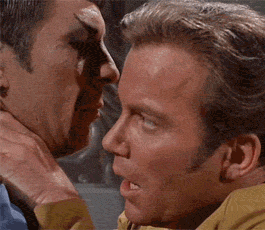
Since this post is about female empowerment it seemed only logical to add as much male homosexuality as necessary.
On to the main reason for this post: male progression as a result of female intervention by way of their sexuality. Specifically I want to address this theme as it appears in literature or myth. I have a few images I’m excited to delve into. But, there are countless others; It’ll probably be better to breeze through a few general ideas and then later get into the denser material. First up is the classic tale of King Arthur.
Primarily, I’m interested in how Arthur got his power. His power essentially came from finding and wielding Excalibur. Now, if that’s not a symbol for male sexuality I don’t know what is. I mean, he can only rightfully rule his kingdom when he possesses his, um, sword? His sword is his manhood and, in turn, his divine right to rule. Pretty patriarchal message, eh? But, wait, there’s more! His sword, dominant though it is, was given to him by none other than the Lady of the Lake. Essentially his power- his sexuality- would all amount to nothing without this mysterious woman. Even within this myth –written in a very patriarchal, religious time-period- has feminist implications. It does warrant consideration.
Looking back on this story after all these years, it’s baffling…and hilarious. It gets more interesting when his “true love”, Guinevere, has an affair with Lancelot, his closest companion. According to common lore and translations, this results – perhaps indirectly- to the fall of Arthur’s kingdom. So, I suppose that Arthur’s kingdom, his “manhood” is taken from him by a woman. Not just that, but his closest male follower was seduced by this same woman. Never mind this subversion of the concept of “true love”, but the situation amuses me to no end. So much power is wielded by these women- these mysterious, background women that grasp Excalibur at the hilt. It’s just plain weird looking back at this and realizing all of these subtle – or not so subtle- elements of feminism in literature that is often regarded as male-dominated. Arguably this is a myth, and one that has been re-told countless times throughout the centuries, the earliest versions contain these elements.
Likewise, in The Duchess of Malfi the tone is overtly feminist. The Duchess, widowed at the beginning if the play, is just now coming to terms with the ability to finally enact her own will. This assertion of her will is the driving force of the play. All the men around her are reacting to this assertion of womanhood. Her newfound lover, Antonio, is strong-armed into becoming her husband. Although, it seems like he is more the bride than she. In awe, Antonio obeys her and agrees to be her lover. Just this simple act of dominance- of going out and acquiring what she desires- is progressive in the extreme. Likewise, her brother -Ferdinand- is forced to act because of the Duchess’ assertiveness. Ferdinand – other than having a deep, incestuous love for his sister- cannot comprehend that a woman is capable of taking control of her body and mind. His thoughts are anti-feminist, but his actions are affected by his sister’s womanhood. The “dagger” that he threatens her with if she were to re-marry is just another facet of this desperate struggle to, uh, dominate her womanhood. Although all of his actions are an attempt to subdue his sister, he is ultimately a victim to her power. Yes, she is killed near the end, but he was the one who truly suffered. Obsession is weakened and possession cannot be achieved in the face of a strong enough Will. And, in this case, it happens to be a woman’s Will.
Furthermore, the short story “The Storm” by Kate Chopin further embraces these feminist concepts. Calixta, the protagonist, is the embodiment of female empowerment. Her passionate –yet brief- affair with Bobinôt is a protest of the societal restrictions of her time. Allowing herself to suspend her fear and embrace the desire. If her desire, if anyone’s desire, is so great that the culmination of said desire leads to the storm that Calixta is feeling- why the fuck would you not act upon the desire? Bobinôt is a paper sailboat in Calixta’s storm- entirely subject to her power. This whole story is just that! It’s an obvious protest against convention, commanded morality, and brutally imposed male sexuality. And the result is an expression of sensations- physical and emotional- too powerful to be contained in a bland, literal context.
I don’t fucking know; maybe I’m getting worked up over nothing. But damn, there just so much there! I mean, I know these are just summaries, but I feel like I’m getting so much out of it. That’s what really matters, I suppose. I’m definitely going to come back sometime, maybe add a paragraph on Paradise Lost, some more Shakespeare, and some Rumi….yet, there are so many stories, so much that I would love to write. Maybe I could just churn out a few pages, just going off on some weird tangents….not that I don’t do that already… Hell, I may even do that. Spring break is next week and I have will finally have free time to breathe and to think.
Anyway, that’s the whole thing about relationships, isn’t it? The women wield the power more often than not. Women are designed by nature to be more selective in partners. This discerning nature is a biological necessity that has become deeply-rooted in our culture. Women choose to whom they give their love- the most important, sincere thing to give. The willing gift of her body and mind, the sheathing of the sword, is more beautiful an expression than she could otherwise falsify. Obviously all of these authors realize this since it’s so painfully prominent in literature. And it is because this power has been recognized, that women have been so subdued for hundreds – if not thousands- of years. Women have more restrictions and taboos placed on them men ever have. That’s just how it is. Those who have this power are doomed to either totally seize it or relinquish it entirely. Medea, (from the Greek play) , The Lady of the Lake, Guinevere, Duchess, Calixta, Eve, Titiana, Adrianna(A Comedy of Errors), Hermione: all of these women had, and implemented, this power. Their Love, their desire, and their Will were too great to be repressed or marginalized.

